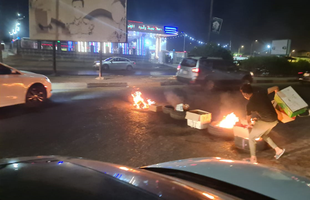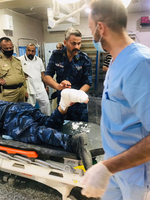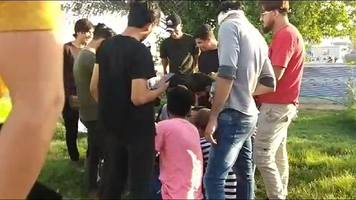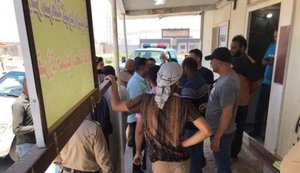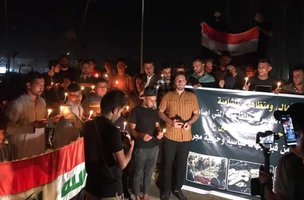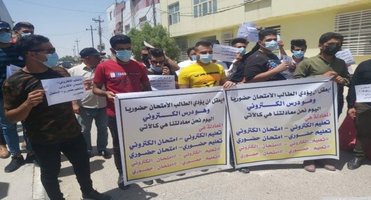Wednesday 14-7-2021
Dozens of workers from Nasiriyah municipality in Dhi Qar governorate demonstrated in front of their office at 8:00 am in protest against the delay in their salaries. They also burned tires as an escalatory step. An eyewitnesses said that the demonstrators burned tires in front of the building in Nasiriyah, expressing their anger due to the delay of their salaries for more than two months. The director of the department received some of them and promised them that their salaries would be paid as soon as the funds were allocated. The protest was not interfered with by any of the security forces and no violence took place. On the second day, the workers announced the strike, which lasted for two weeks, where they agreed among themselves not to remove waste from the city’s streets until their salaries were paid. After 2 whole months of suffering, they received one salary at the end of July, which made them end the strike and continue their work.
Karbala
On day 1, in presence of local media, more than 50 people from the residents of al-Quds neighborhood demonstrated in protest against the lack of services, specifically lack of potable water for nearly 7 days, according to the residents who blocked the main road towards the city center, which caused a stifling traffic crisis after which the security forces were forced to negotiate with them and opened the way in front of the movement of vehicles. It is reported that the protest also witnessed burning of a number of tires and demonstrators accusing the local government for delaying the implementation of water projects in the neighborhood for years.
At 11 pm, more than 150 people protested in front of al-Khairat thermal station, located in north-east of Karbala governorate, due to the inclusion of their areas in the programmed plots, despite the presence of instructions to give the people additional hours of electricity due to environmental pollution as part of their compensation for the construction of the thermal station near their agricultural lands and homes. The protest, which began with a peaceful public gathering, in which the people raised banners with a number of their demands, most notably providing them with electric power, saving their families from the summer heat and condemning the decline of services in the area in which the population exceeds 150 thousand people, but it quickly turned into clashes between the protesters and the security forces near the station prompted the security forces to use live ammunition to disperse the demonstrators by force.
On the 13th, one of the activists contacted us as he and his colleague were being chased in the center of Karbala, whose name is kept anonymous upon his request. After verifying and verifying his allegations from a number of reliable sources, it was found that the activists were heading from the Court of Appeal in Karbala to the Integrity Commission to inform the concerned authorities there of the existence of administrative corruption, and we also confirmed that he was chased by a car carrying three people who were trying to harm them. Other activists near him called for urgent intervention to protect the lives of human rights activists and defenders. On the same day, about 30 people of different age groups organized a protest demanding the disclosure of the investigations results of the repeated fire incidents in a number of governorates, especially the recent Dhi Qar fire, where the protesters raised slogans denouncing the lack of medical services, considering what happened as a major humanitarian crime against the Iraqi people.
On July, 18, a public march was held in the city of Karbala, led by the mother of the activist Ehab Al-Wazani, in solidarity with the International Campaign to end impunity, which was announced by a number of human rights organizations in a number of countries around the world.
Activists demanded the necessity of enacting legislation to guarantee the investigation procedures and to hold the killers accountable, regardless of their intellectual and regional affiliations, stressing that none of investigation results of the assassinations has been announced yet. The march witnessed a clear interest from public opinion and the presence of a number of local media to cover the events, as well as the participation of a large numbers of activists. The number of people in the protest reached around 150, and it was broadcasted directly on a number of social media pages.
On July 21, the family of the activist Ihab al-Wazani, who was killed this year, and the activists asked for the name of Turkish Hospital in Karbala, to be changed and named after Ihab- al-Wazani who, a week prior to his assassination, asked for the hospital to be opened after it had been inactive since 2012.
On 7/30, a number of new Karbala lecturers for the 2020 academic year organized a mass demonstration in front of the local government building in Karbala to demand the payment of their financial allocations. “We have a direct and administrative order in the directorate’s office on 4/1/2020 and within the legal period of Resolution 130 issued by the Council of Ministers, we demand that we be included and our files followed up with the Ministry of Education and the Ministry of Finance and our names and financial cost to be sent to allocate us money like in the rest of the provinces that are in unrealistic numbers.
Mysan:
On Friday, 7/2/2021, in the Qala’at Saleh district, located in the Mysan governorate in southern Iraq, dozens of citizens protested against the electricity problems in the governorate. The protesting demonstrators burned a number of tires. On Friday evening, the security forces responsible for maintaining the district safety went out to try to disperse the protesting crowds and used live ammunition, which led to death of a young man named Haider with a bullet to the head. The medical staff confirmed the death of young Haider due to a gunshot wound to the head.
Where a demonstrator was killed in the Qalaat Saleh district of Mysan governorate due to the suppression of the demonstrators after the people of Qal'at Saleh went out in the streets who protested the power outage two days ago and were confronted by the security personnel of the district building with live bullets, after which a demonstrator was martyred after being shot in the head. The public anger exacerbated after the General Company for the Distribution of South Electricity announced that there had been a near-total cut-off in the national electricity supply, in the governorates of Basra and Mysan, with the cut of a section of Nasiriyah lines, electric power processing hours are reduced.
In a number of Iraqi provinces, the electricity provision has reached zero, while the Ministry of Electricity has been unable even to make promises of near solutions. Today, angry demonstrators in Maysan governorate cut off the main roads in the city center of Al-Amarah and burned tires. Despite the enormous amounts of money that have been spent on restoring the electricity infrastructure, estimated at $80 billion since 2003, all successive governments in Iraq have failed to develop effective solutions.
Some governorates of Iraq witnessed public demonstrations against the impact of a total power outage that lasted for 14 hours in the southern cities of the countries, during which they demanded the accountability of the negligent and the tightening of state institutions from the outlets of corruption that toppled large sums of money under the cover of fake projects. The energy shortage crisis in Iraq came early during the current season, after the collapse reached its peak in the last days of July every year.
The power outage crisis this summer accelerated due to several reasons that accelerated the early entry to the “hell,” of heat including the interruption of Iranian energy and gas supplies, which Iraq has relied on for years to fill the deficit in local production. They amounted to about 30 bombings in one month, while some sources talk about parties behind these actions to achieve political and financial goals.
A source in the ministry of electricity attributed, today, Friday, the cause of the complete power outage in all governorates of Iraq, except for the Kurdistan region, to the recent explosions that affected energy towers, which led to the activation of the self-protection system for the national grid system. Whereas, the explosion of a number of electric power transmission towers in Nineveh and Salah al-din governorates caused a decrease in the processing rate to more than a thousand megawatts, which caused a change in the frequencies of power transmission and the return of the load to the production and generation plants. The failure of the stations to withstand the temperatures and the accompanying discontented demonstrations prompted electricity minister Majed Hantoush to submit his resignation about a year after holding that position.






